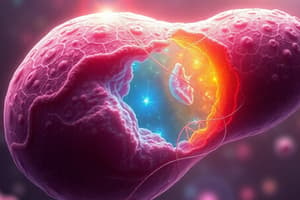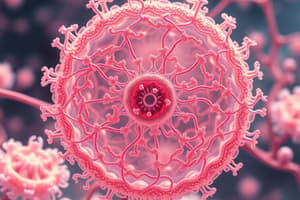Podcast
Questions and Answers
What is the primary characteristic of the early embryonic cell cycle?
What is the primary characteristic of the early embryonic cell cycle?
- It consists of rapid mitotic divisions with little growth. (correct)
- It includes an extended G1 phase.
- It has a prolonged S phase for DNA replication.
- It leads to significant differentiation of cells.
During which phase does the zygote undergo its first division?
During which phase does the zygote undergo its first division?
- G2 phase
- G1 phase
- M phase (correct)
- S phase
What is the duration of the embryonic cell cycle compared to somatic cell cycles?
What is the duration of the embryonic cell cycle compared to somatic cell cycles?
- It is much shorter than somatic cell cycles. (correct)
- It has the same duration as somatic cell cycles.
- It is significantly longer than somatic cell cycles.
- It varies unpredictably compared to somatic cell cycles.
Which of the following phases is typically absent in early embryonic cell cycles?
Which of the following phases is typically absent in early embryonic cell cycles?
Which process is primarily responsible for the rapidity of divisions in the early embryonic cell cycle?
Which process is primarily responsible for the rapidity of divisions in the early embryonic cell cycle?
Study Notes
Early Embryonic Cell Cycle Characteristics
- Early embryonic cell cycles are characterized by rapid divisions with minimal growth phases.
- These rapid divisions result in the exponential increase of cell number without significant increases in cell size.
First Division of the Zygote
- The zygote undergoes its first division during the cleavage stage, which follows fertilization.
Duration of Embryonic vs. Somatic Cell Cycles
- The duration of the embryonic cell cycle is significantly shorter than somatic cell cycles, allowing for faster developmental progression.
Absent Phases in Early Embryonic Cell Cycles
- The G1 and G2 phases, which are growth phases seen in somatic cycles, are typically absent in early embryonic cell cycles.
Process Driving Rapid Divisions
- The rapidity of divisions in the early embryonic cell cycle is primarily due to the lack of checkpoints that normally regulate the cycle in somatic cells.
Studying That Suits You
Use AI to generate personalized quizzes and flashcards to suit your learning preferences.
Description
Test your knowledge about the early embryonic cell cycle with this fill-in-the-blank quiz. Explore the key characteristics, phases, and processes involved as the zygote undergoes its rapid divisions. Understand how the embryonic cycle differs from somatic cell cycles.




